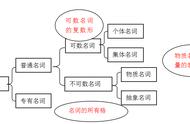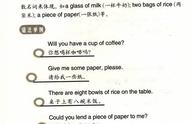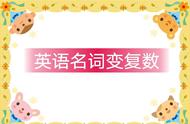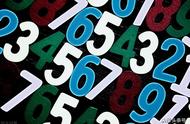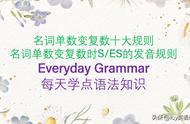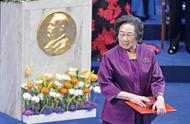
名词
概念:表示人、物品、地点、情感、抽象概念等名称的词
分类:
普通名词 pen teacher water
专有名词 Beijing China July Sunday the Sun
可数名词 apple teacher boy car
抽象名词 advice information news price happiness
不可数名词 液体 water milk tea coffee juice
材料 metal glass wood paper
meat bread rice
可数名词变复数
一般 加s
二般 以s, x, ch, sh结尾,加es
三般 以辅音字母 y结尾,变y为i再加es
四般 以f/fe结尾,变f/fe为v再加es.
妻子持刀去宰狼,小偷吓得发了慌;
躲在架后保己命,半片树叶遮目光。
wife knife wolf thief shelf self life half leaf
以O结尾事真多
英雄喜欢吃土豆、 西红柿和芒果
heroes potatoes tomatoes mangoes
特殊变化要注意
man woman child mouse policeman
men women children mice policemen
特中之特,单复同形
fish deer sheep
fish deer sheep
合成复数有玄机
lemon tree toy shop computer game
lemon trees toy shops computer games
man doctor woman teacher
men doctors women teachers
国人复数不难记
中日人民一致的,英法联军a改e,
其他国人加s, 重点提防德国人。
Chinese→Chinese Japanese→Japanese
Englishman→Englishmen Frenchman→Frenchmen
American→Americans German→Germans
不可数名词量的表达
a piece of paper a cup of tea a bar of chocolate a loaf of bread a pound of meat
名词所有格
有生命的名词: 一般加's
以s结尾的复数加'
无生命的名词: 名词 of 名词

请点击此处输入图片描述
人称代词
主格 I we you he she it they
宾格 me us you him her it them
动词和介词后人称代词用宾格
Give me some water.
Tell him the news.
This pretty dog is for me.
I often write to him.
物主代词
形容词性物主代词 my our your his her its their
名词性物主代词 mine ours yours his hers its theirs
This is my bike.Our English teacher is Miss Xia.
This is mine. Theirs is Mr Wang.
反身代词
myself ourselves yourself yourselves
himself herself itself themselves
Help yourself to some fish.
Make yourself at home.
He teaches himself Japanese.
不定代词
some any
some用于肯定句,any用于否定句和疑问句
但若想让别人作肯定回答时疑问句常常用some
常用于这两个句型:
Would you like to have some coke?
What about some fish?
两对双胞胎
little a little 修饰不可数名词
a little 表示一点儿,虽少但有,表肯定意义
e.g. Mom, I'm thirsty.
There is a little water in the bottle.
little 表示少得快没了,表否定意义
e.g. Jack, go and get some milk. There is little in the fridge.
few a few 修饰可数名词
a few表示几个,虽少但有,表肯定意义
e.g. She has a few friends in the school.
few表示少得快没了,表否定意义
e.g. He is rich but has few friends.
四大天王
both all neither none
both表示两者都
Both of my parents are doctors.
Both my father and my mother are doctors.
Neither表示两者都不
Neither of us likes Jay Chou.
Neither Lily nor Lucy likes Jay Chou.
All表示三者及三者以上都
All of us are here.
All of us like to play football.
None表示三者及三者以上都不
None of us is Japanese.
None of us likes to watch TV.

介词
介词是一种用来表示词与词, 词与句之间的关系的虚词。
常见介词
at before after in on by to near next to with for under
in front of behind from since about
三大时间介词
at on in
↑ ↑ ↑
点 日 剩下
常见的固定搭配:
in the morning/afternoon/evening
at noon/night/midday/midnight
如morning等有任何词修饰,则用on,如on a cold morning
三大方位介词
in Guangzhou is in the south of Guangdong.
on Sichuan is on the east of Tibet.
to Japan is to the east of China.
三大交通方式介词
by car by plane by train by ship by bike
in my father's car in a car
on a bike on his bike
几大易混介词
in front ofHe is sitting in front of me.
in the front ofThe boy sat in the front of the car.
The boy sat in front of the car. (此句子较离奇)
across 横过 She swam across the river.
through 穿过 He went through the door.
There are many apples on the tree.
There is a boy in the tree.
树上长的用on,否则用in
几个小点
We arrived in Tokyo at nine.
We arrived at the cinema at nine.
arrive at用于小地点 arrive in用于大地点
Please answer my question in English.
The woman in red is my teacher.
Look at the man in a hat.
介词后用doing
be good at doing be interested in doing prefer doing to doing thank you for doing

